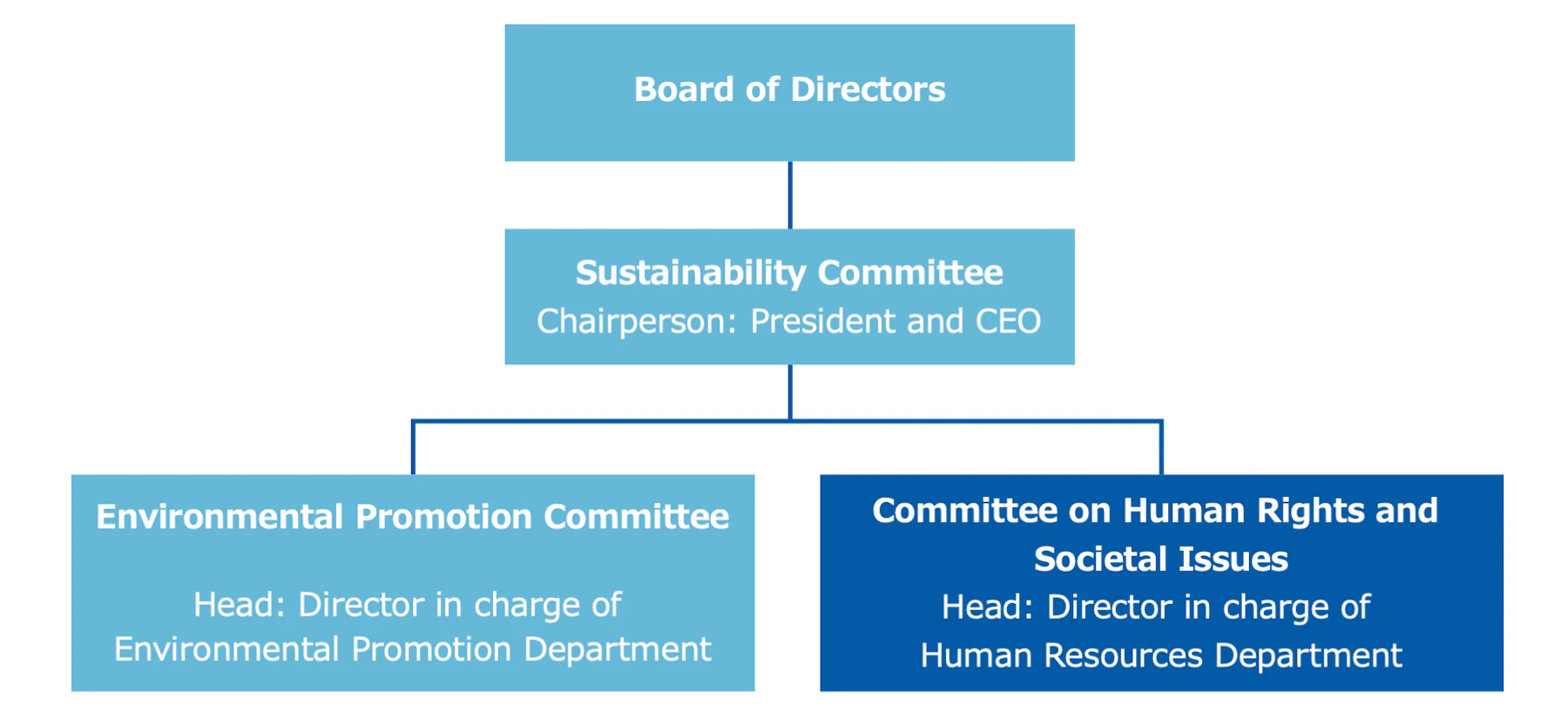Human Rights
人権
Policy on Human Rights
The Mori Building group has been contributing to the realization of a sustainable society where people who live, work, and visit are able to live in good health and vitality, both physically and mentally, through urban development promoted with various stakeholders, including business partners, under the philosophy of "Create Cities, Nurture Cities".
"The Mori Building Group Human Rights Policy" (hereinafter referred to as "this policy") has been established to clarify our commitment to respect for human rights, which is indispensable for the realization of urban development by the group.
This policy was formulated by the Board of Directors of Mori Building and signed by the President and CEO, and is widely publicized both inside and outside the group through our official website for the general public, our internal portal, and in training sessions. In particular, we will ensure that our business partners are fully aware of this policy through the Mori Building group Sustainable Procurement Guidelines, which is based on this policy.
The Mori Building Group Human Rights Policy
- Compliance with international standards, laws and regulations related to respect for human rights
The Mori Building group supports and respects the International Bill of Human Rights (Universal Declaration of Human Rights and International Covenants on Human Rights), which sets forth the fundamental rights that all people should enjoy, the International Labour Organization's (ILO) "ILO Declaration on Fundamental Principles and Rights at Work" which stipulates fundamental rights at work (freedom of association and recognition of the right to collective bargaining, prohibition of forced labor, effective abolition of child labor, prohibition of discrimination in respect of employment and occupation), and the "Children's Rights and Business Principles," which present corporate actions and measures to respect and promote children's rights. This policy is also based on the United Nations' Guiding Principles on Business and Human Rights.
The Mori Building group complies with the laws and regulations applicable in each country or region in which it operates. In cases there is an inconsistency between internationally recognized human rights and the laws and regulations of each country or region, the group will pursue ways to maximize respect for international human rights principles. - Scope of application
The policy applies to all officers, employees, temporary employees and all other persons (hereinafter referred to as "officers and employees, etc.") engaged in the businesses of the Mori Building group.
The Mori Building group also encourages its business partners, including customers and suppliers, to support this policy and to work together with the group to promote initiatives for respecting human rights. - Practicing respect for human rights throughout our business activities
The Mori Building group is committed to the prevention, mitigation, correction, and remediation of any negative impact on human rights that may occur through its business activities, and to the practice of respect for human rights throughout its business activities.
Negative impacts on human rights that may occur through business activities includes cases where the Mori Building group has caused negative impacts through its business or services, cases where it is clear that the group has contributed to negative impacts, and cases where a Mori Building group business partners or related parties are directly connected to a negative impact on human rights through the business or services, even if the group is not directly contributing to the negative impact. - Continuous implementation of human rights due diligence
The Mori Building group will continue to conduct human rights due diligence in order to prevent or mitigate negative impacts on human rights.
This includes the identification and assessment of actual or potential negative impacts on human rights in business activities and supply chains, and incorporation of these assessments results in decision-making and business processes, implementation of appropriate measures to prevent or mitigate negative impacts, as well as tracking and assessing the effectiveness of such measures, and ongoing procedures to externally explain these efforts.
In the event that the Mori Building group initiatives need to be prioritized, priority will be given to the most serious impacts, or those that would be impossible to correct if delayed. - Reviews of salient human rights issues in response to changes in the environment
Since salient human rights issues to be addressed by the Mori Building group can change due to factors such as the social environment and business trends, the group continuously conducts human rights due diligence, and through dialogue and consultation with stakeholders and external experts, to identify and review these issues as appropriate. - Correction and remedy
In the event that the Mori Building group causes an actual or potential negative impact on human rights, the group will work to correct and remedy it through appropriate means, including cooperation with external stakeholders.
the group has established internal and external contact points for consultation and reporting of compliance violations including the situation above. When responding to reports, the anonymity and confidentiality of whistleblowers are ensured. The contact point is available to business partners as well as the Mori Building group officers and employees, etc. - Dialogue and consultation with stakeholders
The Mori Building group improves its efforts to respect human rights based on this policy through dialogue and consultation with various stakeholders. - Education and training
The Mori Building group conducts appropriate education and training to ensure that this policy takes root throughout its business activities. the group also strives to deepen understanding of this policy among its business partners, including customers and suppliers. - Disclosure of information
The Mori Building group reports its efforts to respect human rights based on this policy on its official website and through other means.
Promotion Structure
Mori Building believes that the promotion of sustainability initiatives is critical to the execution of its business. The Sustainability Committee is chaired by the company's President and CEO, and comprises two separate subcommittees: the Environmental Promotion Committee and the Committee on Human Rights and Societal Issues.
The Sustainability Committee deliberates on material sustainability issues such as climate change, human rights, and supply chain management, and supervises and monitors subcommittees. The Board of Directors is regularly reported by the Sustainability Committee, and the Board of Directors deliberates, manages, and supervises material issues.
Committee on Human Rights and Societal Issues, chaired by the director in charge of Human Resources, develops and manages sustainability initiatives related to human rights and societal issues, including respect for human rights, and reports to the Sustainability Committee on a regular basis.
Promotion System Chart

Consultation and Reporting of Human Rights Issues
Mori Building has established an internal reporting system and has set up internal (Compliance Group, Legal Compliance Department) and external (law firm) contact points for consultation and reporting of compliance violations, including those involving human rights violations. These contact points are available to employees, officers, temporary employees, retirees, business partners and employees of our group companies, and we also accept anonymous consultation and reporting. To protect whistleblowers, the company prohibits any disadvantageous treatment of whistleblowers because of their consultation or reporting.
Consultation and reports received are investigated, and if the investigation reveals a violation of respect for human rights, the company takes corrective measures and provides relief to the person concerned.
With regard to harassment, the company clearly states in the Employment Regulations "Prohibition and elimination of sexual harassment," "Prohibition and elimination of power harassment," and "Prohibition and elimination of other harassment," and has also established a contact point to provide professional consultation on harassment-related issues.
Initiatives to Respect Human Rights
Harassment-prevention Training
We provide information on how to create a harassment-free workplace through training for managers. The training for all managers includes lectures on the current status of harassment, harassment-related laws in the workplace, the status of harassment in our company, the consultation contact and how to deal with it, etc. We also provide training for prospective employees to prevent harassment before they join the company.
Consideration for Human Rights at the Time of Recruitment
In the recruitment process, Mori Building makes fair and impartial judgments based not on race, nationality, gender, sexual orientation, age, religion, ethnicity, disability or illness, but on whether a person's abilities and aptitude for the job fit the profile of the type of human resources the company seeks. In order to promote employment without discrimination or prejudice, training is provided to recruiting managers and interviewers to deepen their understanding.
Direct Reporting System to the Human Resources Department
We have a system that allows employees to report their opinions and requests regarding the company and their work, as well as any personal circumstances that they would like the company to know, directly to the Human Resources Department once per year. If there is a request for an interview, a meeting is held between the member of the Human Resources Department and the person who wishes to be interviewed.
Initiatives to Address Customer Harassment
The Mori Building Group has formulated the Basic Policy on Customer Harassment to address harassment of employees by customers and clarify its stance to work systematically to ensure a safe work environment for employees. Based on this policy, we have taken initiatives such as establishing a contact point and providing training to employees.


